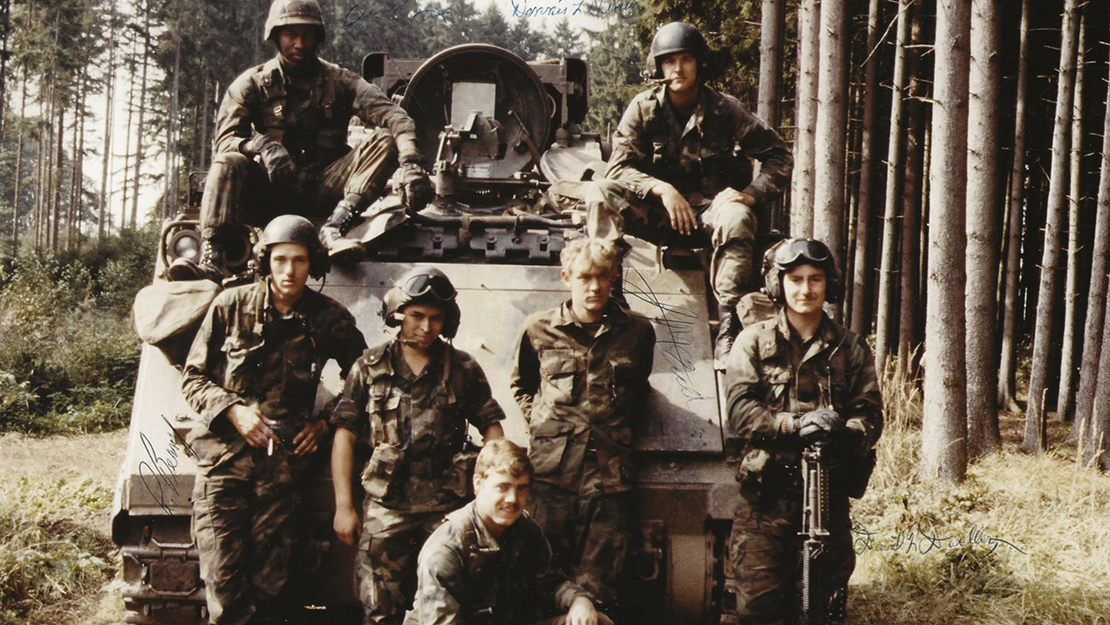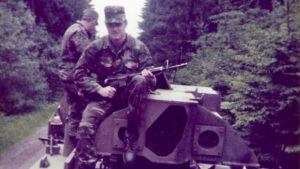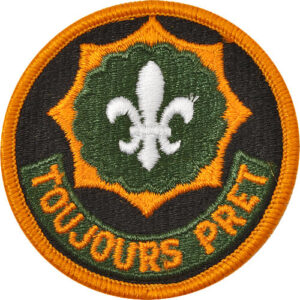Patrol was better than base politics and cleaning latrines

‘Hold the line for two weeks’
CANNON FALLS — Spc. Daniel M. Holmes said about his time as an Army Cavalry Scout with the 1st Squadron of the 2nd Armored Cavalry Regiment, while stationed in West Germany along the Czechoslovakian (Czech) and East German border in 1984-85: “If Russia invaded Europe, our mission was to hold the line for two weeks, but in reality, we had somewhere between two hours and two days before our unit would be overran.”
Toward the end of the Cold War, their unit was stationed in the Fulda Gap, an area containing two corridors of lowlands believed to be a strategic advantage for tanks to be sent in a surprise attack by the Soviets and their Warsaw Pact allies to gain crossing of the Rhine River.
Holmes was stationed with one of three units that rotated from base camp to the border camp where they conducted daily border patrols and field maneuver operations. They primarily used jeeps while maintaining a reactionary force which consisted of a tube-launched optically tracked wire-guided (TOW) missile vehicle and an armored personal carrier (M113). The tank unit stationed with them started out with M60s. Halfway through his year-and-a-half deployment, they switched to the new M1 Abrams.
One time on patrol, Holmes and the other cav scouts witnessed Czech forces remove a dead body along the border. They were not sure if the soldier along the other side of the border was killed by landmines — common in that area — or by other soldiers, but it reaffirmed the serious nature of their mission.
“I really enjoyed the border patrol — out in the field,” Holmes said. “I didn’t like being back in Camp Gates where cleaning duties and politics seemed to take up most of our time. People get bored; they end up doing dumb things, and then the whole troop gets punished for it.”
Holmes was born in Abilene, Texas, the first son of Donald and Elaine Holmes. He was preceded by two sisters, Diana, born in 1955 and Judy, born in 1956. His father started his military career as an airman who served in the Korean War, worked his way up to master sergeant before going through officer cadet training. Eventually he became a missile combat crew commander for the Atlas Intercontinental Ballistic Missile (ICBM) located near Spokane, Wash.
In 1965, after the Cuban Missile Crisis, Don Holmes was transferred to Vietnam while his wife and children moved to Brainerd to be close to relatives. They would leave again in 1966 when his father returned from Vietnam and was stationed in Little Rock, Ark., where his little brother Tommy was born. Then he was at the Strategic Air Command by Omaha. In 1969, his family moved back to Brainerd, and in 1970 he retired from the Air Force as a major and joined his family.

Daniel Holmes attended Lincoln Elementary, Washington Junior High and Brainerd Senior High Schools. During the summers he worked on Grandpa Pederson’s farm and Uncle Don’s as well. It was there he learned about preparing the soil, growing and harvesting wheat, rye, oats, soybeans and alfalfa. He learned how to bale hay and straw, work with machinery, hunt and trap gophers.
Little brother Eddie was born while Dan was a senior working part time at Airmotive Enterprise at the Brainerd Airport. His dad was a flight instructor and, along with his mother, helped him get a private pilot license before graduating high school.
Holmes moved to Moorhead and went to school in Fargo, where he became certified as an aircraft mechanic. From there he got a job at a small airport in Maple Lake. When the company shut down, he attended community college in Brainerd where he received an associate of arts degree. Then he attended Alexandria Technical School for avionics and received his FCC general radio telephone operator license.
With the student loans he took out for college and vocational schooling, he was close to $4,000 in debt. Holmes wanted to further his education, but jobs were scarce. His dad had said he thought every man should serve in the military. He began looking for possible jobs within the different military branches with the hope he could receive funding for college upon completing his enlistment.
He chose the Army cav scouts. It looked tough and exciting, was only a two-year commitment, and offered a $15,000 scholarship. With his educational background, he entered the military as an E-3 private first class in 1983.
Holmes spent basic training in Fort Knox, Ky., where he enjoyed the daily routine of physical training. One morning session of PT, it was dark, and he slipped on the ice, and twisted his ankle. It was a personal setback, but he was still able to keep up with everyone. By the end, he received the George S. Patton Jr. Award for receiving the highest overall score in his troop during basic training.
He was selected for the TOW Missile gunner training where he scored the second highest in the group. Then he was sent to Germany where his deployment and the rest of his enlistment was completed. He left as an E-4, along with his George S. Patton Award, two Army Achievement Medals, and a Squadron Commander’s List Good Conduct Medal.

After the Army, Holmes continued his education at first in welding at Brainerd Vocational Technical College and then began classes at St. Cloud State University. He began working for Airmotive Enterprise again but this time as an aircraft mechanic. He earned commercial, instrument, multi-engine and flight instructor certificates, and started flight instruction, flying fire patrols, and aerial photography, along with doing aircraft maintenance. He bought and started making payments on a champ 7GCB, that his dad had and offered to sell to him. It’s a beautiful airplane that he still owns today.
He enjoyed the work in general aviation, but as an aircraft mechanic, he earned $6.50 cents an hour, and as a pilot or flight instructor, was earning $10 per hour. Yet, he was earning more as a mechanic because the lesson planning, preflight and postflight instruction, wasn’t being paid for. He was paid only for the time the aircraft engine was running.
He only had a semester of college to go but had focused on flying and was living paycheck to paycheck when he was able to get a job with Northwest Airlines as a mechanic in 1990. The starting pay was triple what he was making, and there was also the medical, dental and flight benefits.
A year and a half later he bought a house in South St. Paul. He married Christiana (Chris) Cassen on Dec. 19, 1992, and adopted her son, Crockett James (CJ), named after his great grandfather. His wife’s parents offered them 10 acres of land if they wanted to build on their property, so they designed and built a three-quarter log home with a full walk-out basement. It had a two-by-six outer frame with plywood outer walls which they liked better than the solid log construction. The three-quarter logs were nailed to the outer plywood, creating more insulation and protection.

They had two more children, Elaina, born in 1994, and Evan, born in 1999. All three of their kids loved acting and singing and were active in school plays and choir. In 2007 his wife was diagnosed with brain cancer. After multiple chemotherapy treatments and surgeries over seven years, she passed away.
In 2016 Holmes met Patty Drinkwine, and in 2017, they were married. Now they live in Cannon Falls, where they love to host holiday events and birthday parties for their kids and grandkids. Holmes likes to read, fish, operate his amateur ham radio, and work on his 1957 Jeep Willy he received from his first wife’s family that he plans on giving to their kids someday.
He’s currently the senior engineering technician in the transonic wind tunnels at Collins Aerospace. Specifically, his role is to support the operational needs of production and engineering with environmental stress screening and performance measurements for new and ongoing production.


